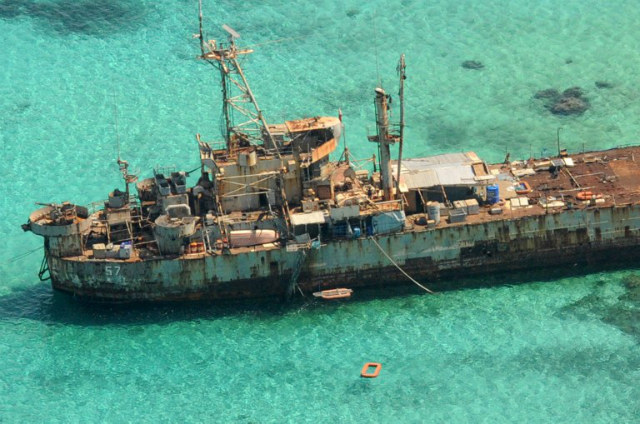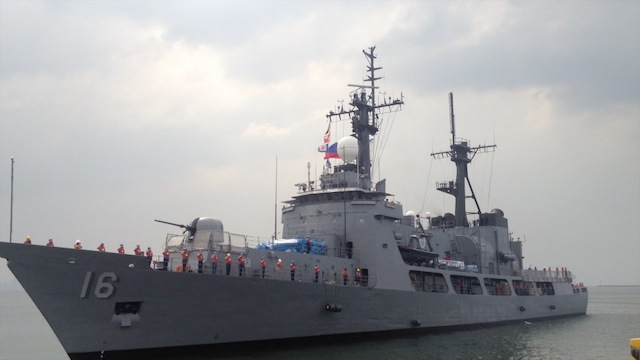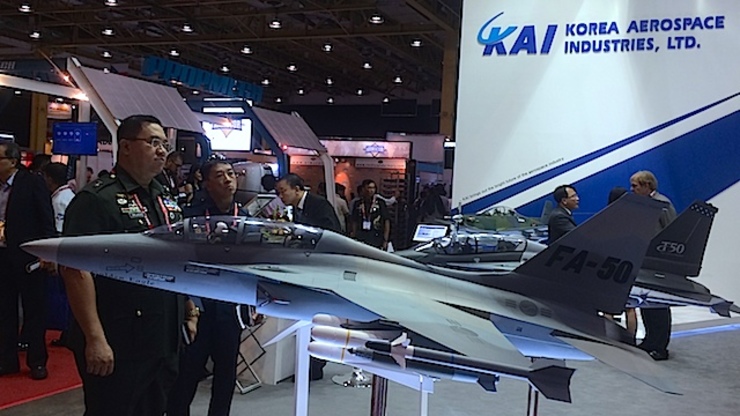President Benigno Aquino III says his administration has released more than P40 billion to modernize the military, the bulk of which goes to the Navy

Armed Forces chief General Gregorio Pio Catapang Jr remembers an old joke about the Philippine Navy that only Filipinos will understand.
“Dati ang biro
nila we have an Italian Navy. Itali ng navy yung barko kasi hindi
makalabas sa puerto. Kasi mahina ang navy natin (They used to joke that we
have an Italian Navy. The navy should just tie the ship down because it can’t
leave the port. We used to have a very weak navy),” Catapang teased the sailors
of the Philippine Navy on July 24.
He and the troops
also had a good laugh as he recalled a time he was aboard a battleship and rust
icicles fell on their beddings after it participated in a naval gunfire
exercise that shook the vessel.
These jokes are a
thing of the past, the new chief of the Armed Forces of the Philippines
President Benigno
Aquino III allocated fresh funds of P85.3 billion (about $1.9B) for the first 5
years of the Revised AFP modernization program under Republic Act 10349. The
leading force in territorial defense, the Navy and the Air Force are getting
big chunks of the funding.
This is on top of
other allocations including shares from the Malampaya funds and Malacañang's Disbursement Acceleration Program (DAP) before the Supreme
Court limited the use of these funds. Some "small item" modernization
projects are now in limbo because of the High Court ruling, however.
President Aquino
said his administration has released more than P40 billion (about $930 million)
to modernize and upgrade capabilities of the military. Out of the RA 10349, the
defense department said 37 projects worth P9.2 billion (about $214 million)
have been completed and more projects worth P17.3 billion ($402 million) will
be delivered next year.
Navy’s SSV to
arrive in 2016
The Philippine
Navy of the 60s was one of the best equipped navies in Southeast
Asia . The presence US
The Philippine
military is playing catch up as maritime conflict over the West Philippines
Sea (South China Sea) escalates,
acquiring capabilities to achieve “minimum credible defense” to deter China
"We are
getting closer to our desired state in terms of capability and readiness with
our recent acquisitions, and those we are expecting to be delivered in the next
few months," said Defense Secretary Voltaire Gazmin said in a statement.
The Navy's twin Del
Pilar class cutters from the US
– currently the Navy’s most
capable ships – are already working together patrolling the West Philippines
Sea in tandem with brand new naval
choppers from Italy

MOST CAPABLE:
Philippine Navy's BRP Ramon Alcaraz. Photo by Carmela Fonbuena/Rappler
These warships will be dwarfed by the 2 Strategic Sea Lift Vessels (SSV) that Indonesian shipbuilder PT PAL are building for the Navy for P4 billion ($93 million). The contract for the ships that will be 2-3 times the size of the Del Pilar cutters was signed in mid-July.
Navy chief Vice
Admiral Jesus Millan said the first SSV will arrive in 2016, before Aquino
finishes his term. SSVs are a multi-purpose ship that can carry a battalion
size of troops and can carry landing craft utility. It has a helipad and a
hangarage for helicopters.
“It
can be used to transport troops. It can be used for sea basing and it can
support HADR (Humanitarian Assistance and Disaster Response) operations similar
to the aftermath of typhoon Yolanda (Haiyan),” explained Millan.
Bidding for what
would be the Navy’s biggest ships is yet to be completed. The Navy is acquiring
2 brand new frigates, one of the big-ticket items in the modernization program
of the military. It has an allocation of P18 billion ($418 million).
The other big-ticket
item is the procurement of a squadron of fighter jets for the Philippine Air Force worth
P18.9 billion ($440 million). The first 2 units of the FA-50 lead in fighter
trainer from South Korea
The defense
department is also completing procurement for air defense surveillance radar systems in Palawan to cover
the West Philippines
Sea (South China Sea) and old radar
sites Lubang Island
The Army is
getting a smaller chunk of the modernization budget but it is getting armored
vehicles and new assault rifles.

FA-50: The Philippines recently signed a contract acquiring
a squadron of FA-50 fighter jets from South Korea
Waiting for SC ruling on Malampaya funds, DAP
In a meeting last
week, Catapang assured Millan that he will continue the plans laid out by his
predecssor General Emmanuel Bautista. But the two leaders recognize that the
Navy cannot have everything it needs because of budget constraints.
“Though we would
like, of course, to have the capabilities na maganda para sa (for
the improvement of the) Philippine Navy, there are some challenges because of
some resources that would support these initiatives. Alam naman natin 'yun.
This would compete with othe requirements of other agencies like education,”
said Millan.
The navy chief
also admitted that they are suffering from the SC temporary restraining order
on the Malampaya funds and they are hoping it can be lifted for the projects of
the Navy. (READ: COA to military: Return P61 million in Malampaya funds)
The Navy got
shares from the proceeds of the Malampaya gas field to fund the development of
facilities in Palawan . Millan said these
facilities support operations in protecting the Malampaya gas field itself.
"This is
part of the process. We are all waiting," said Millan.
The Armed Forces
is also awaiting SC ruling on Enhanced Defense Cooperation Agreement (EDCA), a
new cooperation agreement between the Philippines
and the US
EDCA expands cooperation between Philippines
The Mutual
Defense Board-Security Engage Board (MDB-SEB), co-chaired by AFP chief and the
chief of the US Pacific Command, are scheduled to meet in October to discuss the
implementation of EDCA.
"It's really
urgent. It should be implemented as soon as possible," said Catapang. He
said he also supports his predecessor's recommendation to offer the Americans
the bases in Fort Magsaysay , Subic, and Palawan .
(READ: How far will the US go to defend the Philippines)
Catapang assumed
command of the military as it shifts focus from insurgency to territorial
defense. He may belong to the Army but Catapang said the new challenges that
the military is facing should mean that the next military chiefs should already
come from the Navy or the Air Force.
“I foresee that
the future chiefs of staff will be coming from the Navy and also the Air Force.
The Army will be focused on climate change, global warming, and the typhoons.
We will be the first line of defense for the climate change,” said Catapang.
http://www.rappler.com/nation/64561-philippine-navy-modernization

No comments:
Post a Comment
Note: Only a member of this blog may post a comment.